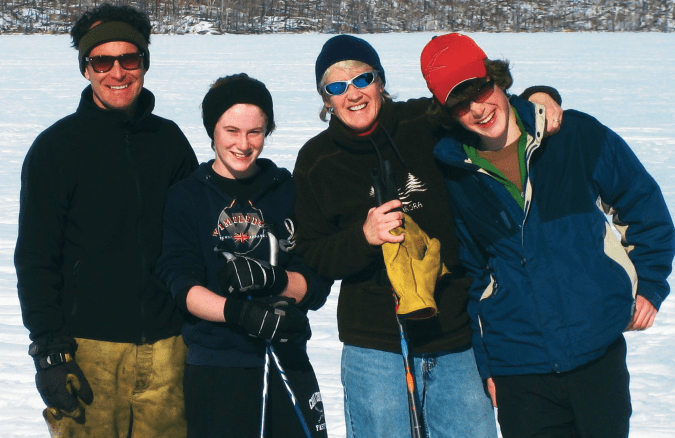What it truly means to be a ‘Boundary Waters Family’

The Ahrendt’s personal histories are steeped in the Boundary Waters experience. Having spent summers as staff at a local camp, they were bitten by “the bug,” and eventually moved to the Gunflint Trail as a couple. Now, as owners of Tuscarora Lodge and Outfitters and in their eighth season of operation, the Ahrendts seek to affect a love of wilderness upon the next generation. And likely, at least a few generations after that.
Andy Wright/Wilderness News interviewed the Aherndts in the fall of 2010.
WN: How did you come to live and work at Tuscarora; what is your story?
Sue: During College, we worked as guide/counselors at Wilderness Canoe Base on Seagull Lake. We met; we fell in love with each other and the woods.
We started our family in Minneapolis, but spent all the time we could remaining connected with the [Boundary Waters] area. We also dreamed and schemed so when Tuscarora went up for sale, we were ready and the timing was right. We went for it.
WN: As an outfitting business, what do you feel makes Tuscarora unique?
Sue: We have a great location, on Round Lake, at the edge of the BWCAW…so pristine that the first night in the bunkhouse is already part of the BWCAW vacation. We were lucky enough to buy a business that was ridiculously clean and well maintained. But really, it’s the people that make it so special here. We have been lucky to have such a fabulous staff/guest community in which to live and raise our kids. It’s an incredible atmosphere. Our guests, our staff – all are loyal stewards to the BWCAW as well.
WN: In the eyes of many nature lovers, you’re ‘living the dream.’ Any affirming moments over the years that stand out and remind you of why you do what you do?
Sue: Crossing from our house to the office on a sunny summer morning while people quietly pack and prepare to take off. I listen to screen doors, to loons, and to the laughter in the kitchen as the staff members prepare breakfast. I love the business of helping people learn about and plan vacations, and then to witness the flow that comes with it.
WN: How did “Becoming a Boundary Waters Family” – as a book and a greater initiative – come to be?
Sue: In 2008 some of the outfitters of the Gunflint Trail got together to plan this initiative. We have all chosen to raise our kids here. We believe that these woods hold great value in the development of kids’ emotional, physical, and cognitive well-being.
So to make it easy for families [to come here] – we started with a website, seminars, and ‘woods wisdom’ that flowed naturally from those of us living here. We partnered with the U.S. Forest Service and with the Greater Minneapolis Kinship program. And, of course, we compiled the book.
WN: A growing concern nowadays is “nature deficit disorder” – the fallout resulting from tech-savvy kids who make little or no contact with the outdoors. In contrast, your everyday life is spent in the open. What wisdom might you have to share about this problem?
Sue: We get caught up in it too – in the off-season, as our kids participate in sports, have access to Facebook, etc. We’ve just been lucky that out our back door, the focus is on outdoor experiences. We’re all out of balance as we figure out how to adapt to all the appealing things that compete for families’ time. Technology isn’t inherently bad, but obviously if the imbalance continues, kids are paying the price.
Andy: On the whole, I think ‘technology people’ enjoy forcing themselves to unplug. Our culture will learn how to manage technology, but it’s important not to lose those connections to nature.
WN: Results from a recent Quetico Superior Foundation poll suggest a trend towards smaller trips and shorter itineraries among campers. Are you seeing this behavior as a good thing? A bad thing?
Sue: I’m glad that they are still finding time to carve out room for BWCAW vacations. I’m heartened by the traditions, the stories people bring. It’s a valuable experience. Nothing is changing that.
Andy: One time, a family with two kids actually did return a day early from their trip. The weather had been so rainy; they’d spent most of their time inside the tent. But the dad reported overhearing his kids say, “We didn’t even know Daddy could laugh that hard.”
There are whole new levels of connection that families make with each other. When you’re out there, it’s real living; and when people come off the trails, they’re happy.
Sue: The woods change; the nature of people’s lives ebb and flow, and we’re glad to adjust to that. We just want to continue to make those opportunities available. I had these opportunities, and I want my kids and their generation to have them too.
WN: And what do you hope those outdoor opportunities will mean for young families, and the wilderness itself?
Sue: People take care of what they know and love, and it is our hope that the children who visit the BWCAW will grow up to become the guardians of this land.

